MAC sets federal legislative priorities in 2024

In advance of next week’s National Association of Counties gathering in Washington, D.C., MAC has finalized its legislative priorities for 2024 on Capitol Hill. (Click here for downloadable PDF of the list.)
“Proper funding for PILT, of course, is a perennial agenda item for MAC, as Michigan has the second-largest amount of untaxable land of the states east of the Mississippi River,” said Deena Bosworth, director of governmental affairs. “And we will be pushing hard, along with NACo, for Congress to reform the Medicaid Exclusion Policy that leaves county taxpayers footing the bill for health services for jail inmates who have not received adjudication.”
Full Funding for Payments in Lieu of Taxes (PILT) Program
- MAC and NACo support restoring full mandatory funding for the Payments in Lieu of Taxes (PILT) program, which compensates counties for untaxable federal land.
- The Permanently Authorizing PILT Act (H.R. 3043) would permanently authorize the PILT program.
- R. 3043 would add boilerplate to U.S. code to permanently and automatically fund PILT.
- The PILT Reauthorization Act (S. 2480) would authorize federal PILT for 10 years.
Reasonable Health Care Cost-sharing for County Jail Inmates
- Access to federal health benefits for non-convicted individuals would allow for improved coordination of care and decrease short-term costs to local taxpayers and long-term costs to the federal government.
- Providing access to federal health benefits for those awaiting trial and verdict decisions would help counties break the cycle of recidivism caused or exacerbated by untreated mental illness and/or substance use disorders, thereby improving public safety.
- While federal legislation to address necessary reforms to the Medicaid Inmate Exclusion Policy (MIEP) is under way, MAC supports requiring the Michigan Department of Health and Human Services to apply for a Medicaid Section 1115 re-entry waiver to reinstate Medicaid benefits for incarcerated individuals prior to release from county jails.
Renewal of the Affordable Connectivity Program
- The Affordable Connectivity Program launched in 2022, which offers discounted broadband service to low-income households, is set to expire in April 2024.
- More than 20 million eligible households have enrolled. Broadband is essential for accessing health care, education, and employment.
- MAC and NACo urge Congress to extend funding for the program so low-income households can continue accessing the internet at a reduced rate.
For questions on MAC’s federal advocacy efforts, visit our advocacy center or contact Deena Bosworth at bosworth@micounties.org.
Tweaked House maps won’t shift state partisan landscape, expert says
 Changes to Michigan House lines mandated by a federal court will result in more compact districts in the city of Detroit, but they will not fundamentally alter the current partisan balance of the House of Representatives, an elections expert said in the latest episode of Podcast 83.
Changes to Michigan House lines mandated by a federal court will result in more compact districts in the city of Detroit, but they will not fundamentally alter the current partisan balance of the House of Representatives, an elections expert said in the latest episode of Podcast 83.
Matt Grossman, director of the Institute for Public Policy and Social Research at Michigan State University, discussed with host Stephan Currie the ongoing map work by the Michigan Independent Redistricting Commission. “(F)ederal courts struck down several districts in the Detroit area in the state House … for violating the Equal Protection Clause of the 14th Amendment by predominantly using race as a reason to draw those districts,” Grossman explained. “So now the commission has been asked to go back and redraw those districts and anything else that is reasonably necessary surrounding those districts to get new house maps for use in the elections this year.
Grossman expects the new lines to result in fewer districts reaching out from Detroit “across Eight Mile Road” and the changes to be confined to the city of Detroit and its inner-ring suburbs.
What won’t really come into play with the changes, Grossman said, is the knife’s-edge partisan balance of the Michigan House, which shifted to a 56-54 Democratic majority after the 2022 elections that used the commission’s original maps.
“The new maps led to the statewide winner of more votes, which was the Democratic Party in the last election, getting a majority in the Legislature to match that statewide majority. … We don’t expect this redrawing to affect that. … We’re talking about — at the most — a half a district difference in partisan composition between the maps that are done now and the maps that will be done after this. … There’s a belief that Detroit was divided up in order to achieve that statewide partisan fairness; that’s not really true,” Grossman said.
View the full video of the episode, recorded on Jan. 30, by clicking here.
Previous episodes can be seen at MAC’s YouTube Channel.
And you always can find details about Podcast 83 on the MAC website.
State to get nearly $12 million in latest opioid settlement
 The state of Michigan is expected to receive an additional $11.7 million from a national settlement with Publicis Health, a global marketing and communications firm. Funds from this settlement will only be directed to the state government and do not include a requirement to distribute funds to the community.
The state of Michigan is expected to receive an additional $11.7 million from a national settlement with Publicis Health, a global marketing and communications firm. Funds from this settlement will only be directed to the state government and do not include a requirement to distribute funds to the community.
Michigan Attorney General Dana Nessel announced the settlement Thursday with Publicis Health to resolve investigations into the global marketing and communications firm’s role in the prescription opioid crisis.
“The filings in the Wayne County Circuit Court describe how Publicis’ work contributed to the crisis by helping Purdue Pharma and other opioid manufacturers market and sell opioids,” the Attorney General’s Office stated. “Court documents detail how Publicis acted as Purdue’s agency of record for all its branded opioid drugs, including OxyContin, even developing sales tactics that relied on farming data from recordings of personal health-related in-office conversations between patients and providers. The company was also instrumental in Purdue’s decision to market OxyContin to providers in patient’s electronic health records.
“According to the Michigan Department of Health and Human Services, between the years 2000 and 2020, the opioid death rate in Michigan increased on average 13.9 percent each year. These deaths — and the impacts on thousands who have struggled with opioid addiction — have created considerable costs for our health care, child welfare and criminal justice systems.”
For more information on MAC’s opioid settlement advisory work, contact Amy Dolinky at dolinky@micounties.org.
MDOT will pay you $10 for your views about infrastructure
 The Michigan Department of Transportation is studying possible changes to how our transportation infrastructure is funded. “As we move toward a low-emission future with electric vehicles and new types of fuels, we need to explore fairer, more sustainable ways to continue to fund and maintain our roads, bridges and public transit systems,” the department says. “This study explores road usage charges, which means that instead of paying state fuel taxes, you would pay a few cents for each mile you drive. To learn more about road usage charges, complete the survey, which includes an informative video.”
The Michigan Department of Transportation is studying possible changes to how our transportation infrastructure is funded. “As we move toward a low-emission future with electric vehicles and new types of fuels, we need to explore fairer, more sustainable ways to continue to fund and maintain our roads, bridges and public transit systems,” the department says. “This study explores road usage charges, which means that instead of paying state fuel taxes, you would pay a few cents for each mile you drive. To learn more about road usage charges, complete the survey, which includes an informative video.”
The study is currently seeking input from the public. “We want to hear from you regarding the fairest ways to pay for our transportation system. Michigan residents aged 18+ who complete the survey will receive a $10 gift card to thank you for your time.”
Terms and conditions apply. Read the full terms and conditions.
 Staff picks
Staff picks
- It’s amazing how many Americans think they live in the Midwest when they don’t (Wall Street Journal)
- Michigan deer: Hunters share thoughts on managing a changing herd (Bridge Michigan)
- Teen offenders in Kent County have a new outlet – esports (MLive)
- The sound so loud that it circled the earth four times (Pocket Worthy)
Counties: Importance of local governments missing from governor’s speech
 A vital tune was noticeably missing from Gov. Gretchen Whitmer’s State of the State “playlist” on Wednesday night: the importance and needs of local governments and the services they provide to Michigan.
A vital tune was noticeably missing from Gov. Gretchen Whitmer’s State of the State “playlist” on Wednesday night: the importance and needs of local governments and the services they provide to Michigan.
That was the assessment of MAC leaders following the governor’s concert-style speech in Lansing on Jan. 24, her sixth assessment of the state’s progress since taking office.
While Stephan Currie, executive director of MAC, praised Whitmer’s comments on the need to build on the state’s economic momentum, he said counties were disappointed at what was not said.
“The governor spoke about bringing people to Michigan, yet she said nothing about the communities they will live in and the quality of life that counties provide,” Currie said. “The strength and attractiveness of Michigan are built upon our assets, our outdoors, our quality of life and our community spirit.
“From traditional responsibilities such as infrastructure and public safety, to newer challenges such as housing availability, public services are essential to thriving communities,” Currie added. “The governor noted how the four largest counties — Wayne, Oakland, Macomb, Kent — supercharged the permitting process to get moving on thousands of new housing units. That’s just one example of how counties are the ‘governments on the ground’ bringing positive change. Now the challenge is to ensure those governments have the support and resources to maintain the momentum.”
In support of that momentum, MAC’s 2024 legislative priorities focus on:
- A secure source of revenue sharing from the state to counties, thereby fulfilling a promise made by state leaders some 60 years ago;
- Legislative action to ensure our local trial courts and juvenile services have the resources to fulfill their role in protecting the public;
- Proper reimbursement for losses incurred by local governments due to tax cuts adopted by state leaders; and
- Addressing a rapidly changing transportation grid by reforming fuel taxes.
“After many years of economic struggle and limited state support, Michigan counties are on a roll,” Currie said. “But to continue this progress, we must now use the moment to address longstanding needs for public services.”
For questions on MAC’s 2024 legislative priorities, contact Deena Bosworth at bosworth@micounties.org.
Podcast 83 team did not rock out to Whitmer’s SOS ‘concert’
 Gov. Gretchen Whitmer’s ’80s-style concert of a State of the State address did not impress, said members of MAC’s Podcast 83 team in their latest episode.
Gov. Gretchen Whitmer’s ’80s-style concert of a State of the State address did not impress, said members of MAC’s Podcast 83 team in their latest episode.
“There was no recognition (in the speech) of the contribution that locals have toward making Michigan a great place,” said Deena Bosworth.
“Well, and it’s not flashy, right?” noted Steve Currie. “What counties do isn’t the flashy stuff; we do the stuff people don’t always think about. So, it’s not always going to be talked about as quickly as some other areas of government that are more flashy economic development. You know those sorts of things, but still important.”
Other parts of the governor’s comments drew a more positive response.
“(The governor) wants to put some money towards affordable housing as well,” Currie said. “We’ve talked in our committees internally, and even at our conference level we’ve had presentations on housing. So, it’s something we’ve long supported is getting affordable housing. It’s an issue everywhere from Wayne County up into the UP.”
“We haven’t seen a full fiscal impact on what the $5,000 care-giver tax credit would be and what exactly the eligibility requirements are. But I will say the Population Growth Council provided data that suggested the portion of our aging population is drastically increasing,” noted Samantha Gibson. “The 65 and up population in Michigan is a pretty staggering portion of our entire population, and we’re already seeing shortages (in care workers).”
View the full video of the episode, recorded on Jan. 25, by clicking here.
Previous episodes can be seen at MAC’s YouTube Channel.
And you always can find details about Podcast 83 on the MAC website.
Learn about Materials Management Plans at Feb. 13-14 conference
 Major changes in state law on handling solid waste, adopted in December 2022, will be the focus of the Virtual Michigan Materials Management Conference on Feb. 13-14.
Major changes in state law on handling solid waste, adopted in December 2022, will be the focus of the Virtual Michigan Materials Management Conference on Feb. 13-14.
The event will focus on the law changes and will provide regional, county, and municipal planners; landfill, compost, and recycling facility operators; and consultants alike with valuable information and tools to foster compliance, advance a circular economy, reduce our carbon footprint and address climate change.
The conference gives those and others the opportunity to learn about what the law changes mean and how they benefit everyone across Michigan. Check out the conference’s agenda and the list of speakers.
How to participate
This virtual Michigan Materials Management Conference will use an online platform called Whova to facilitate networking opportunities and information sharing. Participants will access the conference sessions through the Whova Web App. Don’t worry if you can’t attend all sessions. Recordings of all sessions will be posted in Whova and be available to everyone who registers for the event.
Register today to take part in the conference and network directly with EGLE staff and professionals from around the state. The conference provides up to 8 Continuing Education/Professional Development hours and the cost is only $20.
Click here to begin your registration process.
Webinar series focuses on running better meetings
 A new webinar series focused on principles and practices of local government meetings will launch in March, MSU Extension has announced.
A new webinar series focused on principles and practices of local government meetings will launch in March, MSU Extension has announced.
The Governing Essentials Series is designed for local elected and appointed officials looking to sharpen their skills and promote good governance practices. The webinars can be taken individually or as a three-part series.
This series qualifies for MAC’s County Commissioner Academy. Commissioners can earn two “credits” for the academy by completing all three parts of the series:
- Open Meetings Act: The Michigan Open Meetings Act (OMA) furthers government transparency by requiring elected and appointed boards to provide notice and make decisions in an open public meeting. Participants will learn the requirements of the Act as well as answers to frequently asked questions.
- Introduction to Parliamentary Procedure: Parliamentary procedure based on Robert’s Rules of Order is the most widely used parliamentary authority. This session will focus on parliamentary principles, motions and debate and decorum during meetings. Participants will explore scenarios and practice skills.
- Components of Extraordinary Governance: This session draws the best ideas together for a thorough overview of board governance. Better board governance, leading to more effective organizations, can improve our communities. That’s a goal we can all share!
All sessions will be delivered via Zoom. All webinars will be recorded and sent to registrants. Cost: $20 per session, $50 for the 3-course series. The webinars can be taken individually or as a three-part series. For the $50 series rate, applicants must register for either the spring, summer or winter series.
To learn more or register, click here.
For questions, contact MSUE’s Eric Walcott at walcott3@msu.edu.
Treasury seeks feedback on Uniform Budget Manual
 The Michigan Department of Treasury’s Local Audit and Finance Division is soliciting feedback on January 2024 revisions to the Uniform Budget Manual, which was originally issued in August 2001.
The Michigan Department of Treasury’s Local Audit and Finance Division is soliciting feedback on January 2024 revisions to the Uniform Budget Manual, which was originally issued in August 2001.
The Exposure Draft for the revised Uniform Budget Manual assists local units of government in applying legal requirements and establishing a sound budgeting process. Recommended practices that would enhance the budgeting process are also included.
Any individual or organization that would like to submit comments should provide those comments in writing by Feb. 23, 2024.
Comments may be submitted by email to LAFD_Audits@michigan.gov with the subject line entitled “Exposure Draft – Budget Manual.”
Alternatively, responses may also be submitted via U.S Postal Service to:
Michigan Department of Treasury
Local Audit and Finance Division
PO Box 30728
Lansing, MI 48909-8228
If you have any questions, call 517-335-7469.
 Staff picks
Staff picks
- State of Play: An inside look at artificial intelligence policy and state actions (National Conference of State Legislatures)
- Michigan health insurance market ranks as 2nd least competitive in nation (Crain’s)
- How nuclear energy in the U.S. got its groove back, poised to soar in 2024 (carboncredits.com)
- Yankee influence in Michigan’s Upper Peninsula (Rural Insights)
Podcast team reviews MAC policy priorities for 2024
 A long-sought policy to create a secure source of county revenue sharing dollars and changes in juvenile justice and court policies are discussed in the latest episode of Podcast 83, MAC’s podcast on all matters county-related in Michigan.
A long-sought policy to create a secure source of county revenue sharing dollars and changes in juvenile justice and court policies are discussed in the latest episode of Podcast 83, MAC’s podcast on all matters county-related in Michigan.
Host Stephan Currie led the Podcast 83 team of Deena Bosworth, Madeline Fata and Samantha Gibson through a review of MAC’s 2024 legislative priorities in Lansing.
Topping the list, said Bosworth, is the creation of a Revenue Sharing Trust Fund to hold dedicated state dollars to share with local governments.
“It might still be a little bit of an uphill battle because it does carve out a portion of the state sales tax and cuts into the unrestricted funds the Legislature uses … Hopefully we get some movement on it this spring,” she explained.
Bosworth also reviewed the legislative state of play on reimbursements for losses due to a property tax exemption for disabled veterans, while Gibson discussed the need to reset a legislative “sunset” on the authority of local trial courts to levy fees on defendants and Fata described the numerous challenges to infrastructure funding.
View the full video of the episode, recorded on Jan. 16, by clicking here.
Previous episodes can be seen at MAC’s YouTube Channel.
And you always can find details about Podcast 83 on the MAC website.
MAC releases new tool to aid counties on opioid settlement investments
 MAC has released a new tool to assist members with investing opioid settlement dollars to maximize public health gains.
MAC has released a new tool to assist members with investing opioid settlement dollars to maximize public health gains.
The Michigan Opioid Settlement Funds: Steering Committee Development and Tips for Processing Requests for Funds guidance document came out on Jan. 4. This tool is intended to assist counties with the creation of steering committees to guide planning efforts around opioid settlement funds and review committees associated with funding requests. Attention is paid to who should be involved in the process, which practices should be formalized for purposes of clarity and sustainability, as well as where to consider conflicts of interest. The document also highlights no-cost technical assistance resources available to counties. Guidance around the topics of planning and review committees focuses on the crucial aspects of providing a fair and transparent processes for utilization of settlement funds.
The document is housed alongside other guidance documents and tools in the Templates section of the Michigan Association of Counties Opioid Settlement Resource Center.
For more information, contact MAC’s opioid settlement technical adviser, Amy Dolinky, at dolinky@micounties.org.
Webinar on Feb. 6 to explain federal program helpful to EMS entities
 On Feb. 6, a webinar will brief local leaders on a federal program that could assist local emergency responders.
On Feb. 6, a webinar will brief local leaders on a federal program that could assist local emergency responders.
The Federal Ground Emergency Medical Transportation (GEMT) Program is overseen by the Centers for Medicare and Medicaid Services (CMS). GEMT provides funding and support to eligible health care providers through state agencies, aiming to ensure individuals without reliable transportation can access emergency medical care. This program improves access to emergency services for Medicaid beneficiaries, bridging the gap between patients and health care facilities and facilitating timely care during emergencies.
To register for the webinar, which starts at 12:30 p.m. (Eastern), click here.
While Michigan doesn’t currently participate in the program, our state has the eighth-highest number of Medicaid enrollees in the nation. Local emergency services and ambulance providers are not fully reimbursed by Medicaid to cover the costs of medical transportation for this significant segment of our communities. The GEMT initiative in Michigan seeks to address health disparities, promote health equity and reimburse local agencies and emergency services providers for serving vulnerable populations.
County agencies that may benefit from this program include:
|
|
For more information on MAC’s work on health issues, contact Samantha Gibson at gibson@micounties.org.
Apply now for NACo’s Juvenile Justice Innovation Network
 NACo’s County Juvenile Justice Innovation Network (CJJIN) aims to increase the practical understanding and capacity of counties to address the needs of youth involved in their local juvenile justice systems. NACo will facilitate a network that will learn about best practices and evidence-based resources to inform a strategic action plan that invests in the well-being and future of the youth within their community.
NACo’s County Juvenile Justice Innovation Network (CJJIN) aims to increase the practical understanding and capacity of counties to address the needs of youth involved in their local juvenile justice systems. NACo will facilitate a network that will learn about best practices and evidence-based resources to inform a strategic action plan that invests in the well-being and future of the youth within their community.
Counties selected for the network will have the opportunity to be featured in case studies highlighting innovation and lessons learned, a series of briefs on best practices and implementation and a webinar series. All resources related to CJJIN will be part of the forthcoming CJJIN Resource Hub and will be updated on this page.
CJJIN is a nine-month opportunity for county teams to engage both virtually and in-person to share challenges and successes, learn from national and local experts, exchange ideas with other counties to achieve program and policy change that empowers and improves youth outcomes.
CJJIN will support a community of practice for up to five counties to identify challenges, strategies and an action plan to better support youth by strengthening county juvenile justice systems. Counties participating in the network will identify a core team of up to four champions working across youth-serving systems to join in-person CJJIN activities but are encouraged to invite additional stakeholders that can support the implementation of their strategic action plan.
Applications to join the inaugural cohort will close on Feb. 2 at 11:59 p.m. (Eastern) and can be downloaded here. Applicants will also submit the Team Composition Form, which can be accessed here.
Please send completed applications and questions to Meg Siwek, program manager for justice, at msiwek@naco.org.
 Start the new year off with leadership development!
Start the new year off with leadership development!
MAC congratulates the September 2023 NACo Leadership Academy graduates from Michigan. They join more than 10,000 graduates and current participants from across the country benefitting from the 12-week online program enabling existing and emerging county leaders to achieve their highest potential:
- Joe Porterfield, county administrator, Wexford County
Counties can celebrate the 10th anniversary of the High Performance Leadership Academy by utilizing a special deal: each county can enroll 10 leaders for $15,000 in 2024. The next cohort starts on April 22.
Click here to enroll and learn more.
 Staff picks
Staff picks
- Berrien County looks ahead on the opioid epidemic (The Herald-Palladium)
- One-quarter of U.S. 40-year-olds have never married, a record high (Pew Research Center)
- State and Local Tax Collections Per Capita (map) (Tax Foundation)
- Michigan Indoor Radon Results Map (Department of Environment, Great Lakes and Energy)
Federal court orders new lines for set of legislative districts
 Some of Michigan’s House and Senate election districts face a revamp in wake of a Thursday afternoon ruling by a federal court on a challenge that the existing maps unconstitutionally handled African-American voters.
Some of Michigan’s House and Senate election districts face a revamp in wake of a Thursday afternoon ruling by a federal court on a challenge that the existing maps unconstitutionally handled African-American voters.
The state’s Independent Redistricting Commission, which drew the maps and which was created via a ballot proposal in the 2018 elections, said in a statement it was “aware and disappointed” in the ruling that targets 13 House and Senate districts.
The commission has until Jan. 2 to submit a brief to the court on how it thinks the redrawing process should be done for the 2024 House elections.
The Michigan House is currently split 54-54 between Democrats and Republicans, following the resignation of two Democratic members who won mayorships in November. Special elections to refill those seats are set for April.
On social media Thursday evening, Steven C. Liedel, an attorney for the Dykema law firm wrote, “Even if (the) Independent Redistricting Commission were to redraw maps that affect other districts, the new House districts would be effective for the November 2024 election, not the special elections.
“No Senate elections until 2026,” he added.
The districts in question are:
- House District 1, currently represented by state Rep. Tyrone Carter, D-Detroit.
- House District 7, currently represented by state Rep. Helena Scott, D-Detroit.
- House District 8, currently represented by state Rep. Mike McFall, D-Hazel Park.
- House District 10, currently represented by state Rep. Joe Tate, D-Detroit.
- House District 11, currently represented by state Rep. Veronica Paiz, D-Harper Woods.
- House District 12, currently represented by state Rep. Kimberly Edwards, D-Eastpointe.
- House District 14, currently represented by state Rep. Donavan McKinney, D-Detroit.
- Senate District 1, currently represented by state Sen. Erika Geiss, D-Detroit.
- Senate District 3, currently represented by state Sen. Stephanie Chang, D-Detroit.
- Senate District 6, currently represented by state Sen. Mary Cavanagh, D-Redford Township.
- Senate District 8, currently represented by state Sen. Mallory McMorrow, D-Royal Oak.
- Senate District 10, currently represented by state Sen. Paul Wojno, D-Warren.
- Senate District 11, currently represented by state Sen. Veronica Klinefelt, D-Eastpointe.
MAC will closely monitor the situation and brief members on how it might affect county legislative priorities in 2024 and beyond, said Director of Governmental Affairs Deena Bosworth.
 MAC scores wins in short, but busy, year in Lansing
MAC scores wins in short, but busy, year in Lansing
In a year abbreviated by an early adjournment of the Michigan Legislature, MAC and its 83 members still scored several policy victories in Lansing, highlighted by the adoption of a long-overdue reform of juvenile justice law and progress on a dedicated Revenue Sharing Trust Fund.
To see a complete summary of MAC’s work on key county issues at the State Capitol, click the image or here. (The summary is organized alphabetically by issue area.)
For questions on MAC’s advocacy work, contact Director of Governmental Affairs Deena Bosworth at bosworth@micounties.org.
Podcast 83 team reacts to report of governor’s population council
 A sweeping, yet vague, set of recommendations by a state panel is the subject of the newest episode of MAC’s Podcast 83 this week.
A sweeping, yet vague, set of recommendations by a state panel is the subject of the newest episode of MAC’s Podcast 83 this week.
Host Stephan Currie and MAC Governmental Affairs Team of Deena Bosworth, Samantha Gibson and Madeline Fata give some quick takes on the report of the Growing Michigan Together Council, which was formed by Gov. Gretchen Whitmer earlier in the year to address Michigan’s demographic challenges.
Responding to a question by Currie about the role and history of state task forces in Michigan, Bosworth noted, “(Task forces highlight) the need for focusing on policy in specific areas.” She added, however, that in the “vast majority of them, we don’t get a whole lot of action items.”
As always, the question of money is central to the discussion, team members noted.
“It’s billions of dollars … to implement all of these recommendations in there,” Bosworth said, adding that the report “really doesn’t say ‘raise revenue here to put it there.’”
“I don’t know how hard it hits on what we do about (attracting and keeping young people), beyond throwing money at the problem,” argued Gibson.
“It was great to put all this information together,” Bosworth said. “The major theme is that we have stopped investing in our state.
“We are 25 percent below the revenue we were collecting in our state General Fund from 2000. How are we going to fund all of our infrastructure if we are not collecting that much revenue?”
Council documents include:
- Full council report (86 pages)
- Executive summary (6 pages)
View the full video of the episode, recorded Dec. 19, 2023, by clicking here.
Previous episodes can be seen at MAC’s YouTube Channel.
And you always can find details about Podcast 83 on the MAC website.
MAC sets office hours for holiday break
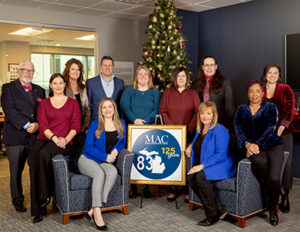 MAC’s Lansing offices will be closed on the following dates to observe holidays:
MAC’s Lansing offices will be closed on the following dates to observe holidays:
Friday, Dec. 22: Closing at noon for staff event.
- Monday, Dec. 25: Closed.
- Tuesday, Dec. 26: Closed.
- Friday, Dec. 29: Closed.
- Monday, Jan. 1: Closed.
If you have any questions or service requests between now and Jan. 2, please call 517-372-5374.
 Legislative Update taking holiday hiatus
Legislative Update taking holiday hiatus
Today is the last edition of MAC’s “Legislative Update” for calendar 2023.
To see any 2023 edition of Legislative Update, visit the News section of MAC’s website.
Normal posting of the email will resume on Friday, Jan. 12.
Apply for the 2024 NACo Achievement Awards
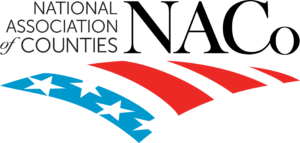 Since 1970, the NACo Achievement Awards have recognized outstanding county government programs and services. Through a non-competitive application process, noteworthy programs receive awards in 18 categories that cover a vast range of county responsibilities.
Since 1970, the NACo Achievement Awards have recognized outstanding county government programs and services. Through a non-competitive application process, noteworthy programs receive awards in 18 categories that cover a vast range of county responsibilities.
In 2023, five Michigan counties received NACo awards.
If you are ready to begin your application, click here to access the application portal. In addition, you can use the portal to view, edit and submit previously saved applications.
Only county governments and state associations of counties are eligible to submit applications. There is no limit to the number of applications that can be submitted by a single county. Regional partners are welcome to submit applications for a collective project; however, the associated county or state association must submit the application on the group’s behalf.
For more information on the program, click here.
 Staff picks
Staff picks
- Michigan’s natural resource economy is threatened by invasive trees and shrubs (Citizens Research Council of Michigan)
- Column: How the retail lobby sold a $45-billion whopper about organized shoplifting (Los Angeles Times)
- State Budget Overview (Senate Fiscal Agency)
- 2023 State of the Great Lakes Report (Michigan Department of Environment, Great Lakes and Energy)
Juvenile justice package adopted as MAC scores win in 2023 priority
 Nineteen pieces of a 20-bill package to make sweeping reforms to the juvenile justice system, long backed by MAC, was signed into law by Lt. Gov. Garlin Gilchrist this week.
Nineteen pieces of a 20-bill package to make sweeping reforms to the juvenile justice system, long backed by MAC, was signed into law by Lt. Gov. Garlin Gilchrist this week.
House Bills 4624-43 and Senate Bills 418-423, 424, 425, 426, 427, 428-429, 430-431 and 432-437 are a result of the Michigan Task Force on Juvenile Justice Reform’s recommendations provided in July 2022.
One bill, HB 4630, did not advance out of the Legislature.
The Task Force on Juvenile Justice Reform was established in 2021 and tasked with assessing Michigan’s juvenile justice data and identifying ways to improve the system. Two county commissioners served on the Task Force, each nominated by MAC. Alisha Bell of Wayne represented a county with a population over 100,000, and Marlene Webster of Shiawassee represented a county of under 100,000 in population. Rep. Sarah Lightner, R-Jackson and a former county commissioner, also served on the panel.
The task force discovered several challenges to strengthening public safety and improving outcomes for youth. This led to the set of 32 recommendations provided to the Legislature last year. The recommendations would improve community safety, reduce disparities and improve youth outcomes.
SB 418, by Sen. Sylvia Santana (D-Wayne), enhances the County Child Care Fund (CCF) by establishing a minimum framework of juvenile justice best practices statewide, including the use of risk screening and assessment tools. The best practices will be supported by an increase in the reimbursement rate for community-based services from 50 percent to 75 percent, including 17-year-olds. These changes are essential to ensuring counties have the resources to implement and utilize these approaches. The reimbursement rate for residential services will be 50 percent, including the 17-year-old population.
SBs 419–423 and HBs 4625-29 require the consistent use of validated screening and assessment tools to enable more objective decision-making and allow agencies to better match youth to appropriate supervision and services, reducing their likelihood to recidivate. The bills also expand the Diversion Act so that all offenses, with an exception for youth committing a specified juvenile violation, are eligible for pre-court diversion, based on the use of a risk-screening tool and other factors, and limit the time that a youth can be placed on pre-court diversion, unless the court determines that a longer period is needed. While diversion eligibility would be expanded, judicial discretion remains.
HB 4630, by Rep. Lightner, would have expanded the Michigan Indigent Defense Commission to include development, oversight and compliance with youth defense standards in local county defense systems. It never received a vote in the Senate. It remains to be seen if the Legislature will revisit this bill in 2024.
Enacted bills will take effect Oct. 1, 2024.
MAC supported this package as a 2023 priority.
For more information on this issue, contact Samantha Gibson at gibson@micounties.org.
Growing Michigan Council sets goals – but specifics lacking as to funding
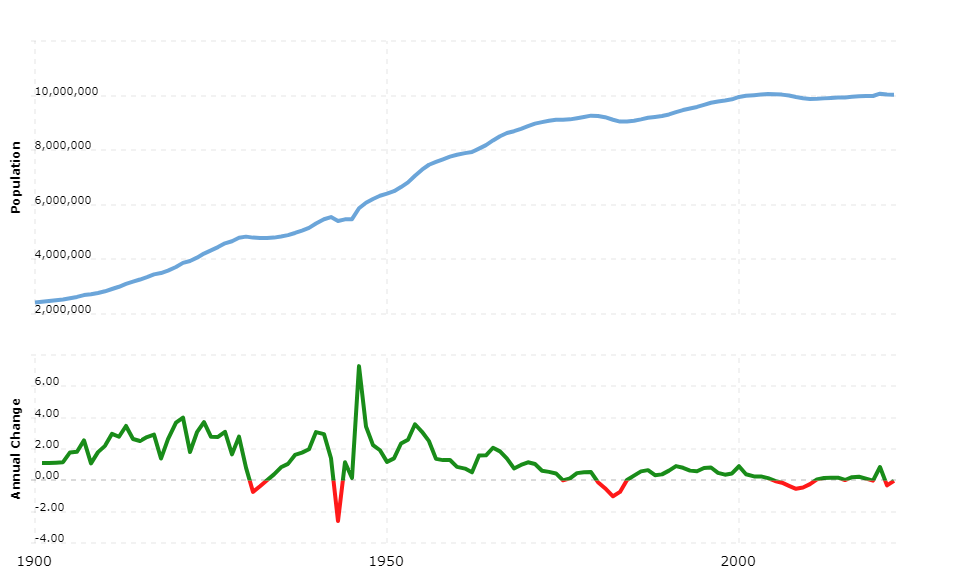
Michigan’s population has hovered around the 10 million mark for decades while other states have seen significant increases. (Source: Macrotrends.net)
The Growing Michigan Together Council, a special task force formed by Gov. Gretchen Whitmer that was notably lacking in local government representation, released a report this week for new state investments in human capital.
In its report, the council describes the hard truth facing Michigan, which is now ranked 49th out of 50 states in population growth, has seen its median income, fall, its population age and its infrastructure investments lag.
The report is light on blame for this decline but instead makes it a collective problem that we will have to face and change together:
- Full council report (86 pages)
- Executive summary (6 pages)
To counter these trends, the panel sets out three main components and subsequent recommendations, include establishing Michigan as an innovation hub, the creation of lifelong learning focused on future readiness skills and competencies and on creating thriving, resilient communities that are magnets for young talent.
Following the actionable items in the report are recommendations on ensuring momentum and taking a hard look at state policies and their funding models and an honest look at the return on investment for the state’s 10 million residents.
MAC’s Podcast 83 team will have its reactions to the council report in an episode scheduled for release on Wednesday, Dec. 20.
For more information or to provide thoughts and feedback on the report, contact Deena Bosworth at bosworth@micounties.org.
Presentations from 2023 Policy Summit
State launches online tool for FOIA requests
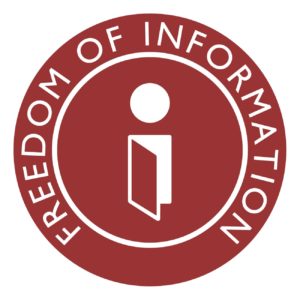 A new online tool for Freedom of Information Act (FOIA) searches was unveiled this week by Secretary of State Jocelyn Benson.
A new online tool for Freedom of Information Act (FOIA) searches was unveiled this week by Secretary of State Jocelyn Benson.
The new service will allow documents to be made publicly available online as part of a FOIA request. Rather than fulfilling multiple requests, the document will be accessible online to any interested party for one year.
Changes to the way the Department of State responds to FOIA requests come after an influx of requests for election materials in recent years. This system will make the process easier for both the requestor and the team fulfilling requests behind the scenes. Online payment will be accepted for the first time, adding another level of convenience.
It is possible other agencies will follow suit should this program prove successful.
For more information on MAC’s advocacy work on FOIA issues, contact Madeline Fata at fata@micounties.org.
Medication aide legislation signed into law
 A package to create medication aide registration and permits, supported by the Michigan County Medical Care Facilities Council (MCMCFC), has been signed by Gov. Gretchen Whitmer.
A package to create medication aide registration and permits, supported by the Michigan County Medical Care Facilities Council (MCMCFC), has been signed by Gov. Gretchen Whitmer.
House Bills 4885 and 4923, by Reps. Donovan McKinney (D-Wayne) and Joseph Aragona (R-Macomb), respectively, allows for the training and registration of medication aides in a manner similar to registration and training for nurse aides, commonly referred to as certified nurse aides, or CNAs.
The changes will address staffing shortages within county medical care facilities; likely increase retention and recruitment for nurses, nurse aides and medication aides; and reduce overall errors by freeing up nurses within facilities.
For more information on this issue, contact Samantha Gibson at gibson@micounties.org.
Podcast 83 reviews MAC opioid settlement services
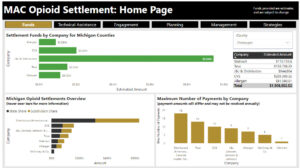 A special episode of Podcast 83 features MAC’s opioid settlement services to member counties.
A special episode of Podcast 83 features MAC’s opioid settlement services to member counties.
Host Stephan Currie interviews Amy Dolinky, MAC’s technical adviser for settlement services, about her work with dozens of Michigan counties and what questions and issues have arisen in her statewide travels.
“I’m engaged with 60 counties providing various levels of support,” explained Dolinky, who joined MAC about a year ago to work specifically with members on the complicated task of best deploying national opioid settlement dollars in their communities.
Dolinky explained she has been involved in everything from helping counties plan for creation of an advisory panel, all the way to helping folks think through what transparency looks like with their spending decisions.
“And (MAC has been) working with some counties on strategic planning efforts,” she noted.
During the discussion, Currie and Dolinky reviewed the payment timeline, with Dolinky noting that while each company has a set number of payments, they are not being issued on a standard fiscal year or annual basis — and amounts can differ from year to year.
County members with any questions about opioid settlements are encouraged to review MAC’s extensive resources on the web and/or contact Dolinky directly at dolinky@micounties.org.
View the full video of the episode, recorded in November 2023, by clicking here.
Previous episodes can be seen at MAC’s YouTube Channel.
And you always can find details about Podcast 83 on the MAC website.
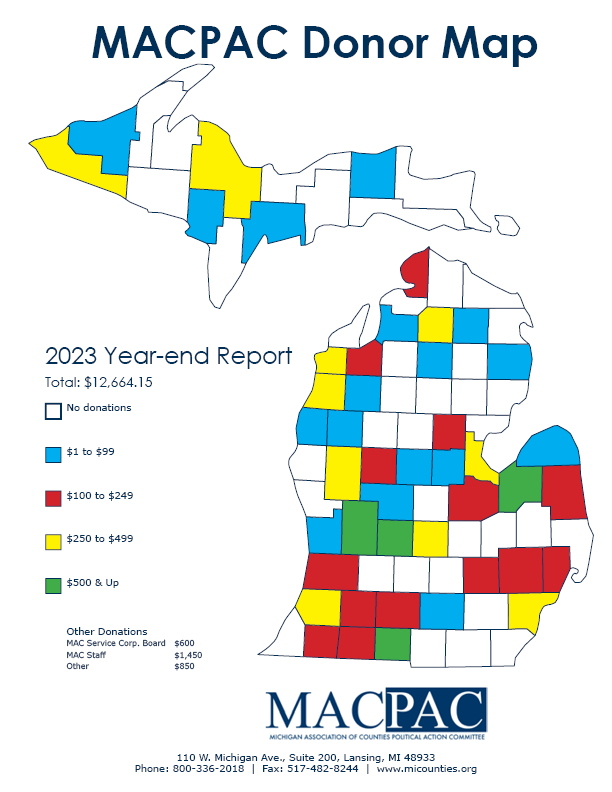
MACPAC nearly reaches $13,000 mark in 2023
Continuing its rebound from pandemic-year lows, the MAC Political Action Committee raised nearly $13,000 for a 12-month period ending on Dec. 4, 2023.
MACPAC, the only PAC in Michigan committed to supporting sitting legislators who have proven themselves to be allies of effective and efficient county government, received $12,664.15 for the year. It was backed by 80 individual donors, with donations coming from 45 of the 83 counties.
In his first months in office, Board President Jim Storey of Allegan County has spoken often about the important role MACPAC plays in MAC’s overall advocacy efforts, including at last week’s 2023 Policy Summit: “(W)hen you combine our PAC with our individual voice in our home communities, we are very strong, we are very effective.”
To learn more about MACPAC’s work or make a click online donation, click here.
Treasury seeks public comment on accounting documents
 The Michigan Department of Treasury provides direction to local governments on accounting and auditing in the form of Numbered Letters and Michigan Committee on Governmental Accounting and Auditing (MCGAA) Statements. To ensure this information is up to date and useful for its trusted partners, Treasury has begun the process of removing and updating the Numbered Letters and MCGAA statements from 1993 to the present.
The Michigan Department of Treasury provides direction to local governments on accounting and auditing in the form of Numbered Letters and Michigan Committee on Governmental Accounting and Auditing (MCGAA) Statements. To ensure this information is up to date and useful for its trusted partners, Treasury has begun the process of removing and updating the Numbered Letters and MCGAA statements from 1993 to the present.
Its ongoing goal will be to update Numbered Letters and MCGAA Statements every five years to make sure they are maintained adequately, with a focus on updating 20 percent a year. Most of the updates made will be to bring all these publications to our most current format and ensure all weblinks within those resources are accurate. Many will need to be revised more substantially or even removed from being active.
In addition to the content updates, Treasury is changing the MCGAA Statements to Numbered Letters. For this release, there will be four MCGAA Statements that will be changed to Numbered Letters. The revisions include updating to our current format and ensuring all weblinks are accurate.
The Local Audit and Finance Division is currently soliciting public comment on selected Numbered Letters and MCGAA Statements (which have been changed to Numbered Letters). Any individual or organization that would like to submit comments should provide those comments in writing by Jan. 12, 2024.
You can find the selected Numbered Letters Exposure Drafts and Numbered Letters for Public Comment below:
Comments may be submitted by email to LAFD_Audits@michigan.gov with the subject line entitled, “Numbered Letters Exposure Draft.”
Alternatively, responses may also be submitted via U.S Postal Service to:
Michigan Department of Treasury
Local Audit and Finance Division
PO Box 30728
Lansing, MI 48909-8228
If you have any questions, contact Treasury at 517-335-7469.
 Staff picks
Staff picks
- Meeting Michigan’s renewable energy targets will require regional coordination (Citizens Research Council of Michigan)
- Red regions, blue states and the urge to separate (Governing)
- 2024: 12 predictions for cities and counties – AI stars in all (American City and County)
- Italian officials secure 12th Century leaning tower in Bologna to prevent collapse (Associated Press)







